Suchergebnisse für "Factsheet%3A Energietechnologien gestalten%2C die f%C3%BCr alle sinnvoll und nutzbar sind"
Forschungsagenda Solarthermie
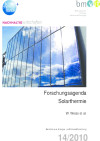
Schriftenreihe
14/2010
W. Weiss et al.
Herausgeber: BMVIT
Deutsch, 91 Seiten
Downloads zur Publikation
Energiespeicher Beton
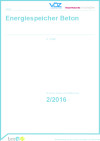
Schriftenreihe
2/2016
K. Krec
Herausgeber: BMVIT
Deutsch, 204 Seiten
Downloads zur Publikation
Bauen mit Hausverstand
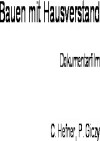
Dokumentarfilm
C. Hefner, P. Giczy
Herausgeber: BMVIT
Deutsch, 11 Seiten
Downloads zur Publikation
New4Old
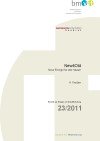
Neue Energie für alte Häuser
Schriftenreihe
23/2011
A. Knotzer
Herausgeber: BMVIT
Deutsch, 60 Seiten
Downloads zur Publikation
Bioenergy in Austria
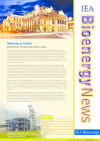
242/2012
Herausgeber: IEA-Bioenergy
Englisch, 8 Seiten
Downloads zur Publikation
ÖKO-OPT-QUART - Economically optimized control and operating mode of complex energy networks of future city districts
In the project ÖKO-OPT-QUART energy-based, economic and control-orientated models will be developed in order to simulate the operating mode of complex, sustainable energy networks in city districts. For an exemplary configuration these models will be combined to an overall model which allows a realistic economic comparison of different control strategies. The final goal of the project is the development of a method for the systematic design of cost-optimized, predictive control strategies for complex energy networks in city districts.
Lehm - Passiv Bürohaus Tattendorf
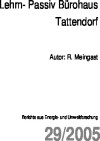
Schriftenreihe
29/2005
R. Meingast
Deutsch, 85 Seiten
Downloads zur Publikation
Solar Cooling Position Paper
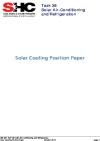
Herausgeber: Solar Heating and Cooling Programme, Task 38 Solar Air-Conditioning and Refrigeration
Englisch, 20 Seiten
Downloads zur Publikation
Nachhaltig Bauen als Zukunftstrend
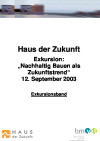
Herausgeber: BMVIT
Deutsch, 23 Seiten
Downloads zur Publikation
FTE-Strategie zur Althaussanierung
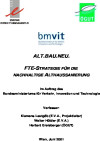
Herausgeber: BMVIT
Deutsch, 40 Seiten
Downloads zur Publikation
Verbraucher als Virtuelles Kraftwerk
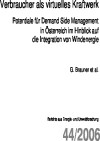
Schriftenreihe
44/2006
G. Brauner
Deutsch, 94 Seiten
Downloads zur Publikation
Sanierung ökologischer Freihof Sulz
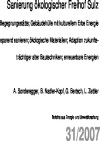
Schriftenreihe
31/2007
A. Sonderegger, B. Nadler-Kopf, G. Bertsch, L. Zettler
Herausgeber: BMVIT
Deutsch, 73 Seiten
Downloads zur Publikation
LES! - Linz entwickelt Stadt!
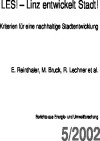
Schriftenreihe
05/2005
E. Reinthaler, M. Bruck, R. Lechner et al.
Deutsch, 103 Seiten
Downloads zur Publikation
Neue Veranstaltungen im Herbst
PH Office
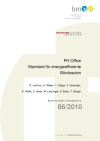
Standard für energieeffiziente Bürobauten
Schriftenreihe
86/2010
R. Lechner, U. Weber, et al.
Herausgeber: BMVIT
Deutsch, 76 Seiten
Downloads zur Publikation
Kälteanlagen im Hotelund Gastgewerbe
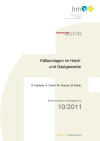
Schriftenreihe
10/2011
R. Kapferer, A. Greml, W. Kreuzer, M. Braito
Herausgeber: BMVIT
Deutsch, 232 Seiten
Downloads zur Publikation
Research Agenda Biobasierte Industrie
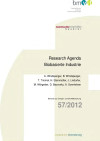
Schriftenreihe
57/2012
A. Windsperger et al.
Herausgeber: BMVIT
Deutsch, 83 Seiten
Downloads zur Publikation
Technischer Status von Wohnraumlüftungen
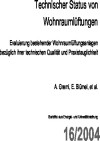
Schriftenreihe
16/2004
A. Greml
Deutsch, 298 Seiten
Downloads zur Publikation
Wandsysteme aus Nachwachsenden Rohstoffen

Schriftenreihe
31/2001
R. Wimmer, H. Hohensinner, L. Janisch, et.al.
Deutsch, 99 Seiten
Downloads zur Publikation
SIP- Siedlungsmodelle in Passivhausqualität
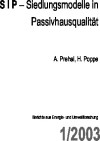
Schriftenreihe
01/2003
A. Prehal, H. Poppe
Deutsch, 274 Seiten
